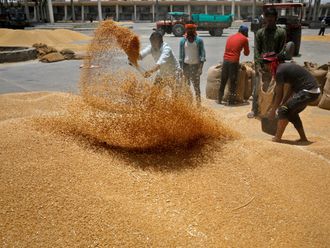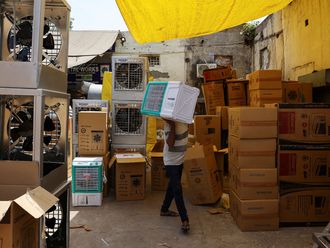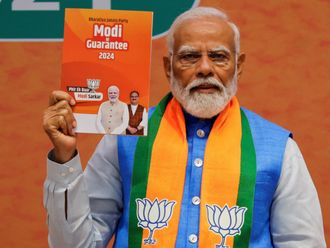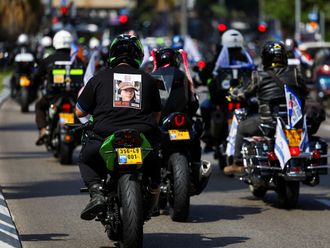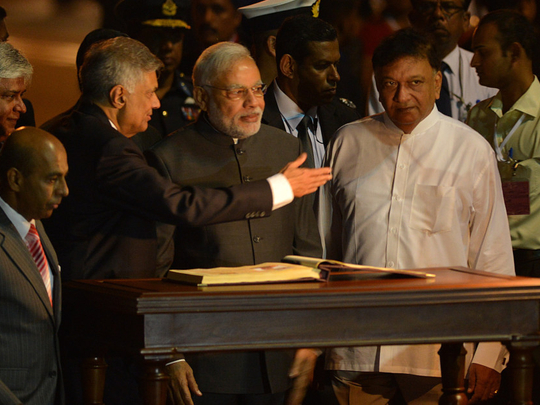
COLOMBO: Narendra Modi began the first official visit by an Indian premier to Sri Lanka in nearly three decades on Friday, looking to reassert New Delhi’s influence over Colombo after its drift towards China.
Modi will hold talks with Sri Lanka’s new President Maithripala Sirisena, who has promised to repair international ties damaged under his predecessor Mahinda Rajapakse’s China-friendly regime, after a ceremonial welcome in Colombo.
The Indian prime minister will also address parliament and visit the Tamil-dominated northern Jaffna region on a visit that comes just weeks after Sirisena made India his first foreign port of call since his election in January.
While observers don’t expect major policy initiatives so soon after the neighbouring leaders’ last meeting, it is seen as an important signal of a desire to reset ties.
“I am sure together we are going to script a golden chapter in the history of India-Sri Lanka relations,” Modi said this week as he set off on a three-nation Indian Ocean island tour that has already taken him to the Seychelles and Mauritius.
He travels north on Saturday for a landmark visit to the Jaffna peninsula, home to the island’s Tamil minority and which bore the brunt of a 37-year separatist war in which India was intricately involved.
Modi is expected to push for demilitarisation in the former war zone and more autonomy for minority Tamils who share close cultural and religious ties with those across the Palk Strait in Tamil Nadu.
Modi will be the first Indian prime minister to hold bilateral talks in Colombo since 1987, although several predecessors attended regional summits.
Rifle assault
When Rajiv Gandhi visited in 1987, the then premier was famously assaulted with a rifle butt by a Sri Lankan naval rating while inspecting a guard of honour.
Gandhi had gone to sign a bilateral pact that sought to end a guerrilla war by Tamil separatist rebels who had effectively enjoyed a safe haven in India since the mid 1980s.
The main rebel group, the Tamil Tigers, repudiated the peace accord and India ended up fighting the militants they had once trained and armed.
Around 1,140 Indian soldiers lost their lives during the 32-month deployment in Sri Lanka and Gandhi himself was assassinated in 1991 by a female Tiger suicide bomber while campaigning in Tamil Nadu.
After the war ended in 2009, relations remained strained and Sirisena’s predecessor Rajapakse caused unease in New Delhi by forging close ties with Beijing.
India, which traditionally regarded Sri Lanka as within its sphere of influence, was furious last year when Rajapakse allowed two Chinese submarines to dock in Colombo.
Under Rajapakse, Sri Lanka built up steady debts as Beijing funded a string of major construction projects.
Since his loss to Sirisena in a January election, the pendulum has swung back towards India with the new president making attempts to renegotiate the terms of some loans.
Sri Lanka’s new rulers last month also ordered a suspension of China’s biggest investment project, a $1.4 billion new city on reclaimed land just next to Colombo’s main sea port.
‘Diplomatic recalibration’
Mangala Samaraweera, Sirisena’s foreign minister, has said that while Colombo wants to retain good relations with China, “we will not go overboard like the Rajapakse regime”.
Charu Lata Hogg, a Sri Lanka expert at London’s Chatham House think-tank, said there were signs of “a recalibration in its previous relationships with China in favour of improved ties with the West and India”.
Modi is expected to finalise energy and construction deals, including funding for Sri Lanka’s creaking railways.
He will also lay the foundation stone for a cultural centre in battle-scarred Jaffna where he is expected to receive a rapturous reception.
He will be only the second foreign leader since independence to visit the region, where India is seen by locals as a crucial protector against the dominance of the ethnic Sinhalese majority.
Beijing was a key defender of Sri Lanka at international forums when Rajapakse came under criticism over its rights record and allegations that 40,000 Tamil civilians were killed at the end of the war.
Modi’s predecessor, Manmohan Singh, pointedly shunned a Commonwealth summit hosted by Rajapakse in 2013 over the treatment of Tamils.


